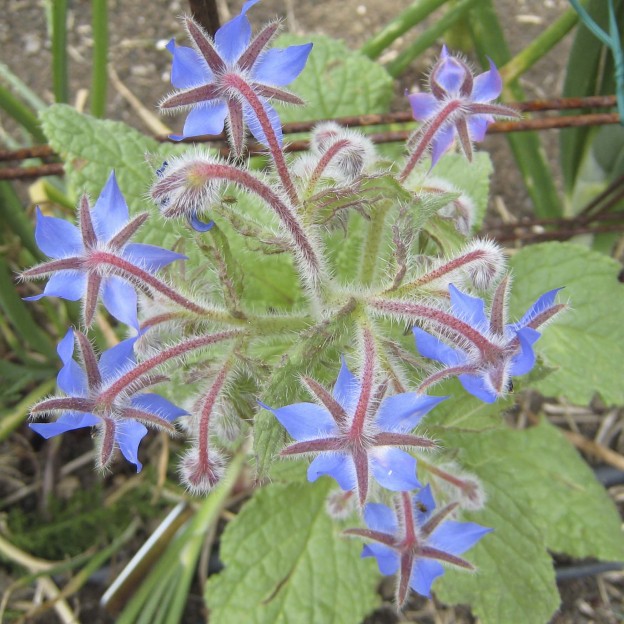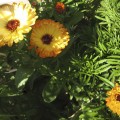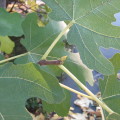Borage is considered an herb, although there are some cultures that eat their leaves like lettuce. I think they must have to rub off the hairs before eating the leaves, though, unless the younger leaves are less hairy. The flower petals are also edible. They are reported to taste like a crisp cucumber, but I wasn’t really able to taste anything… They are a beautiful blue color, and regardless of how they taste, they make a typical salad into a centerpiece. They also can be added to drinks or frozen in ice cubes. Or, like other edible flowers, candy them for decorations on cakes, pastries or other desserts. One source did state that if eaten in large quantities it can have a diuretic effect.
Botanical Information
Taxonomy
Borago officinalis
History
Physical Description
Borage is an annual that grows to about 2-3 feet tall, and has hairy leaves & stems (ouch!) The flowers are beautiful, though. Blue-purple flowers are star-shaped and many of them come out of a central stalk, hanging down like falling stars. The stems that the flowers hang from are part of the beauty – they are burgundy-red with hairs that catch the light. They start flowering around mid-summer.
Varieties & Cultivars
Categories or Types of Borage
Colors Available
Varieties to Grow
Growth Requirements
Climate & Temperature Requirements
Air Temperature
Soil Temperature
Humidity
Day Length or Light Requirements
Borage likes full sun.
Site Conditions Favored
Soil Requirements
Soil Texture
Borage likes light, rich, well-aerated soil.
pH
Nutrient Requirements
Propagation
Methods of propagation
Seed
- Sow borage seeds in spring
- Borage reseeds itself readily; I’ve only had to start two plants about 4 years ago, and every year I get a good crop of volunteers. Volunteers should be thinned to about 2 feet apart.
Division
Not an option
Cuttings
Never tried growing borage from cuttings – probably would work, but the seeds are so plentiful & quick to germinate I wouldn’t bother. As a matter of a fact, last year I believe several stems that were laying in the soil rooted themselves into the soil, so I know cuttings would work.
Transplanting or Potting Up
Seed Saving
Planting Out
Bed Prep & Soil Amendments
Bed Spacing
- Final spacing should be about 2 feet apart
Planting Depth
Alternative Bed Methods
Container Gardening
Borage can be grown indoors: put them in a sunny (south) window, with plenty of water and lots of root space. Remember that they get pretty tall (2-3 feet).
Routine Cultivation & Maintenance
Water Requirements
Fertilization Recommendations
Mulching & Weeding
Pinching or Pruning & Dividing
Support
Winterizing
Companion Planting
Helpful Companions
Harmful Companions
Companion to..
Pests, Diseases & Problems
Common Pests
Common Diseases
Symptoms
Whole Plant
Leaves
Stem/Trunk
Flowers
Fruit
Roots
Harvesting & Storage
Edible Parts of the Plant
- Flowers: have a crisp, cucumber flavor (although I don’t taste much of anything when I’ve had them)
- Young leaves
Yield
Days to Harvest / Harvest Timing
Borage is flowering from about midsummer until fall, so all through this time you can harvest the flowers.
The leaves can be harvested from spring through winter, until the frost kills it back.
Harvest Methods
Borage Flowers
- Harvest in the morning, after the dew has dried, but before the day starts heating up
- Hold the flower head by the stem, then pluck the whole petal unit off the pistil by pulling a petal. It should pluck off easily, leaving a hole in the center of the star-shaped flower.
Storage of harvest
Fresh
Store Borage flowers until you are going to use them, between layers of damp paper towels in a plastic bag in the refrigerator. They will wilt unless kept air-tight with some moisture.
Canned
Can’t think of why I’d try to can them…
Frozen
Borage flowers are a beautiful addition to ice cubes. Think of adding them to ice bowls or pitchers for a party.
Pickled
Haven’t tried adding them to pickles, but they might look nice if the vinegar solution is crystal clear, water-white. With their cucumber-like flavor, they may be a good addition.
Dried
Borage flowers do not dry well.
Cooking
Nutritional Benefits & Values
Toxicity
Although not toxic, per se, if eaten in large quantities, borage can have a diuretic effect.
Cooking
Preparation
- lightly rinse them, if needed, then allow them to dry thoroughly, if using fresh
- Candied borage flowers are a great addition to desserts
Recipes (link to …/category/recipes/tag/[plantname])
- Salads: sprinkle on top of a green salad
- Garnish: the star-shaped flowers look great on the side of the plate, or sprinkled on top of a dip
- Beverages: float flowers on top of drinks, or freeze the flowers in ice cubes or freeze them inside ice-bowls for a cool buffet display
- Desserts: candied borage flowers are great on cakes, pastries, or other desserts
Resources
Information for this article was taken from these sources. (link to …/category/resources/tag/[plantname])




